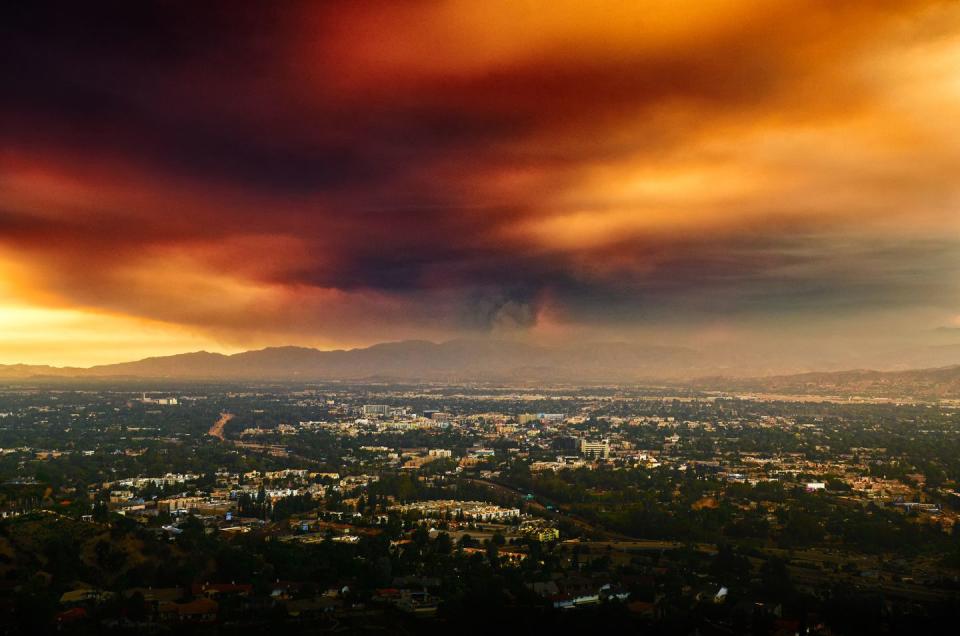How to Improve Your Air Quality at Home During a Wildfire

"Hearst Magazines and Yahoo may earn commission or revenue on some items through these links."
Editor's Note: This article was originally published in 2023 and has been updated to reflect current events.
With wildfires currently raging across Los Angeles and strong winds carrying smoke and pollutants, much of the area is experiencing unhealthy air quality. When a wildfire smoke advisory is in effect, it's important to limit your outdoor exposure (and if you must go outside, wear an N95 or P100 mask). But you should also be concerned about the air quality inside your home.
"Buildings are not air-tight, so outdoor air quality definitely affects indoor air quality," said Robert Laumbach, MD, MPH, associate professor of environmental and occupational health and justice at Rutgers University School of Public Health. "When we see air quality levels that are acutely hazardous, such as from wildfire smoke, you should take a few precautions to reduce your exposure."
Smoke from wildfires can affect you in various ways. The airborne particles (or particulates) sent aloft by the heat of the fire can travel long distances. These microscopic particles can get into your eyes and respiratory system, whether you're indoors or out. Even if you're healthy, your eyes may sting and feel dry, your throat may feel scratchy, or you could have a headache or runny nose. In addition, studies have shown that when particulate levels are high, there’s an increased risk of heart attack or stroke in some individuals, said Dr. Laumbach.
Though the smoke from wildfires often clears within a few days, here's what you need to know about how to improve your indoor air quality right now.
How Do I Find My Air Quality Rating?
You can find your local outdoor air quality at AirNow.gov, which is run by the Environmental Protection Agency. Its air quality index (AQI) measures particulate levels, which are a mixture of solid particles and liquid droplets. "You cannot see individual particulates, but you can see them aggregated when you see smoke," said Dr. Laumbach.
When AQI values are between 101 and 150, it’s unhealthy for sensitive individuals such as kids, older people, pregnant women, and people with underlying health conditions such as heart disease, COPD, diabetes, or asthma. When the values are higher than 151, it's unhealthy for everyone, even healthy individuals, to be outdoors, said Dr. Laumbach.

How Big Is a Particulate?
Particulate matter includes inhalable particles that are 10 micrometers in diameter or smaller, and fine particulates, which are 2.5 micrometers or smaller. To give you perspective, a human hair is 70 micrometers in diameter, which is 30 times larger than the largest fine particle!

How Can I Improve Indoor Air Quality During Wildfires?
If you’re healthy, you’re usually not at a major risk from short-term exposures to wildfire smoke, said Dr. Laumbach. But it's still smart to avoid breathing in these tiny particles. Here's what you to do to improve indoor air quality at any time, with tips from Dr. Laumbach, Dr. Chew, AVMA, EPA, CDC, and the American Lung Association:
Stay indoors. When the AQI values are higher than 151, it's unhealthy for everyone to be outside. Postpone outdoor activities such as mowing or going for a run.
Keep windows and doors closed.
Bring pets indoors and keep potty breaks brief. Don't go for long walks, and save outdoor play sessions for when air quality improves, said Dr. Chew.
Use a portable air cleaner. HEPA filters are best because they remove 99.97 percent of the particles in the air that pass through the filter. Run your air filter on the highest fan setting around the clock.
DIY a temporary air cleaner. Attach a furnace filter to a box fan with duct tape (find instructions here). Research has shown these homemade units can remove some particles, said Dr. Laumbach.
Upgrade your home’s HVAC filter to a high-efficiency filter. Use one that has a MERV13 rating, which indicates a filter's ability to capture particles between 0.3 and 10 microns. Check with your manufacturer to learn what type of high-efficiency filter your system fan and filter slot can accommodate.
Run your air conditioner on "recirculate." This can filter out some of the particles that are coming in from outdoors.
If using a window air conditioner, make sure the seal between the unit and the window is as tight as possible. AC units with a single hose should not be used because they actually can bring more smoke indoors, according to the EPA.
Reduce rigorous indoor activity, too. It's better to play it safe because you don’t know how much your indoor air quality has been affected, said Dr. Laumbach.
Avoid activities that create more fine particles indoors. That includes using gas or wood-burning stoves, spraying aerosol products, frying food, burning candles, or vacuuming (unless you have a vacuum with a HEPA filter).
In your car, run the AC and set to "recirculate."
If you must work outside, wear a properly fitting N95 mask. "It won’t work if air is going around the filter, not through it," said Dr. Laumbach. Check out how to fit one correctly to your face.
Call your doctor or vet ASAP if a family member has any concerning symptoms. That includes symptoms such as difficulty breathing, coughing, gagging, wheezing, an asthma attack, lethargy, or chest pain. Stay alert and keep calm until the air clears.
What to Look for in an Air Purifier
When shopping for an air purifier for your home, Will Vizuete, PhD, an air pollution expert from the University of North Carolina at Chapel Hill, suggests checking the California Air Resources Board, an organization that’s been certifying and evaluating indoor cleaning devices since 2010.
The best type of purifier filter for your home depends on what air particles you mainly want to target for removal. If you live in a smoke-prone area, consider a device with a HEPA (High-Efficiency Particulate Air) filter or electrostatic purifier. While Vizuete says larger particles can typically be taken care of by the filter on your air conditioning unit, the smaller ones are more difficult to get rid of and tend to be more harmful. For gasses, you’ll want a filter that can absorb them onto another medium, so an organic carbon material like charcoal is a great pick. There are also plenty of air purifiers on the market that combine a carbon filter with a HEPA filter to target as many pollutants as possible.
Are Pets Affected by Air Quality?
Here's the bad news: They sure are. "They may experience similar symptoms as we do, such as coughing, difficulty breathing, and eye irritation," said Debbie Chew, DVM, of East Greenbush Animal Hospital in East Greenbush, New York. "Pets who have underlying health conditions, such as allergies or asthma or cardiovascular disease, are at greater risk from smoke."
In addition, brachycephalic breeds that have short, broad skulls, such as pugs and bulldogs, puppies, kittens, and senior animals also may be especially at risk. Birds are particularly susceptible to air quality issues and should not be allowed outside when particulate matter is present, according to the American Veterinary Medical Association (AVMA).
Follow House Beautiful on Instagram and TikTok.
You Might Also Like


